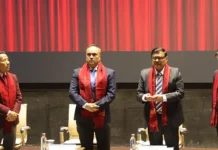[Ripi Bagra]
As the state gears up for the forthcoming elections, money has once again emerged as a focal point of conversation. Money wields significant influence in the political landscape of Arunachal Pradesh, shaping electoral outcomes, policy decisions, and governance dynamics. Elections in Arunachal are characterised by extravagant spending, with candidates vying to outspend their opponents to secure victory. This culture of lavish campaign spending underscores the significance of money in electoral politics, where candidates often spend a lot of money to secure votes. The victory of a candidate hinges solely on their financial capacity. Politicians in the state openly acknowledge this reality. While finances do influence elections in various parts of India, in Arunachal, they are overwhelmingly paramount, leaving little room for other considerations.
Irrespective of performance, capability, or any other factor, what truly matters in Arunachal is the ability to spend money during elections. Candidates often pay an average of Rs 20,000 per voter, with skilled negotiators earning lakhs. Many voters exploit the situation. The demand for two-wheelers and similar incentives is widespread. Candidates often transform their homes into campaign hubs, initiating these camps roughly a month before the election date. They maintain an open kitchen round the clock, welcoming all voters. Free food, meat, and liquor are readily available, attracting people from all political camps. Voters freely move between camps, taking advantage of the free offerings without regard for their affiliations.
Even student politics in Arunachal is not immune to the influence of money. Elections within student associations often involve significant spending, with aspiring office bearers investing substantial sums to secure their positions. This trend underscores the pervasive nature of money in the state’s political culture, where financial resources can determine access to power and influence at all levels of society.
The central government is making significant investments in various projects across the state. The emergence of large-scale projects, especially in the hydroelectric and highway sectors, has fuelled economic growth but has also led to allegations of corruption and cronyism. The influx of funds from these projects has intensified competition during elections, with candidates vying for financial resources to finance their campaigns. Candidates invest substantial amounts of money in election campaigns, often recuperating these expenses through corrupt practices upon winning. Consequently, the quality of projects suffers, leading to inconvenience for the public. The nexus between money and politics raises concerns about accountability, transparency, and the equitable distribution of resources. Moreover, the prevalence of financial incentives can incentivise corrupt practices, undermining the integrity of democratic institutions and eroding public trust.
Shouldn’t voters who accept money for their votes also share responsibility for the poor development of their place? When voters engage in this practice, they perpetuate a cycle of corruption that undermines the integrity of the democratic process. By accepting bribes, voters contribute to the election of candidates who prioritize personal gain over the public good. Consequently, elected candidates may feel emboldened to engage in corrupt practices, diverting funds from infrastructure projects for their benefit. Therefore, while candidates are responsible for engaging in corrupt activities, voters who accept bribes share culpability for the adverse effects on infrastructure quality and overall governance.
Addressing the challenges posed by the money-centric culture in Arunachal politics requires concerted efforts to promote transparency, accountability, and equitable representation. Stricter regulations on campaign financing, enhanced oversight mechanisms, and greater public awareness are essential to mitigate the undue influence of money on the political process. Moreover, fostering a culture of ethical governance and promoting meritocracy can help safeguard the integrity of democratic institutions and ensure that the people’s best interests guide political decisions.
In conclusion, the role of money in Arunachal politics cannot be overstated. Financial resources are central in shaping the state’s political landscape, from elections to governance. While money’s influence presents significant challenges, it also underscores the need for comprehensive reforms to promote transparency, accountability, and inclusive governance. Only through concerted efforts can Arunachal realise its democratic aspirations and ensure that political power remains accountable to the people it serves. (The contributor is from Jawaharlal Nehru University, New Delhi.)


